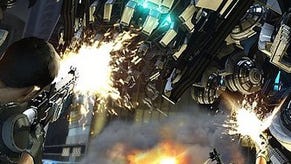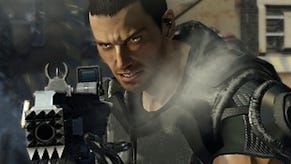The Politics of Trust: Sega's Nagoshi on Binary Domain
Sci-fi shooter BInary Domain seems a departure for Yakuza creator Tashihiro Nagoshi, but Alex Donaldson uncovers a similar emphasis on human relationships.
With solid sales in Japan and fans in the West so devoted they petitioned to get it released there, Toshihiro Nagoshi could’ve easily stuck with the Yakuza series for a long time to come. He’s not a man who seems to want to stay still, though, which has led him to Binary Domain, the new third person shooter Sega hopes can sell as well as Bayonetta.
We met up with Nagoshi at gamescom 2011 and had a brief demo of the title to find out what it’s all about and how he hopes that this game can buck the trend of Japanese third-person shooters failing to gain any traction with Western gamers.
“Yeah, we’ve always been interested in using more of the senses to create a unique experience,” Nagoshi explains when asked why he ended up on Binary Domain, a genre seemingly miles away from his stomping ground of Yakuza.
“We’re in a world where games are becoming a hybrid media where you can use your aural senses, visual senses – and not just input, you can also output your movements such into controlling the characters on the screen. When it comes to more recent motion controls like Kinect you can actually use your body movement and actions to output things on screen, so that’s really a hybrid of what came before.”
Binary Domain isn’t a Kinect title, though, and instead utilizes another input method – voice. Players can use a headset to issue voice commands and interact with members of their squad, as they battle robots that think they’re humans in a Blade Runner-style world.
“I’ve always really wanted to create a game which uses all the possible combinations of these different senses. This is one way – one answer to that idea,” Nagoshi tells us after the demo.
“Not only can you talk with your friends in multiplayer, but you can also talk and have interactions with computer controlled AIs. After people see and play this game, our hope is that people will recognize how fun voice control can be and will start to think that having voice recognition and using it wisely can set a new bar for standards in games.”
Some people, of course, are wary about looking like they’re crazy by barking out commands while alone in their living room. Nagoshi thinks in this world, that won’t be an issue.
“It’s true that some people still have problems and are embarrassed by the idea of sitting in their living room talking to a game. But actually, video games can do quite a lot that you wouldn’t normally do in real life. I’m confident that I can create an immersive world that you believe in, and hopefully that will make you forget about the embarrassment!”
Voice control isn’t required to play Binary Domain, but the idea of it is key to the overall vision of the game, and the reason Nagoshi believes it stands a better chance of gaining traction in the West than other Japanese third-person shooter attempts such as Square Enix’s MindJack. Binary Domain comes with a new ‘trust’ mechanic that sees the player tasked with building bonds with and gaining the affection of their party members.
Rather than choices taking place on a Bioware-style dialogue wheel, the player is instead judged on how they act during combat. A player who asks a weaker party member to constantly head into the line of fire will be respected less than one who risks their own backside instead. Similarly, AI allies might ask for help, or ask you to cover them with fire while they move to a new piece of cover.
"We’re kind of making a list – a wish list of things that we would like and things that current games are not doing so far."
Helping them out will increase trust, while ignoring these requests will lead the AI to trust you less and ask for less help in the future – which also means they’ll be less effective in combat. There’s different ways to respond, too – so being rude or abrasive will lose trust, while nicely refusing a request for aid won’t do as much damage to trust levels as just ignoring it.
It’s a unique take on the morality mechanics that have swept through gaming in the past few years, and Nagoshi is unashamed in admitting he’s learned lessons from other games in the genre, though he doesn’t name any specifics.
“We obviously looked at other competitors that offer multiple choices within gameplay and rather than trying to tick off all the boxes that other games have we tried to look at the things they’re not doing really well.”
“When looking at the currently available games we have to prioritise what is working well and what are the things that should be abundant, and what should be obsolete – what we have to change. So, we’re kind of making a list – a wish list of things that we would like and things that current games are not doing so far. With that, I think we’ve created something quite different from what other games in the market are doing.”
We’re shown two separate demos from the same level with high and low levels of trust. With trust levels high, the AI allies are some of the most active and powerful I’ve seen in a game of this kind. They call out for help, help each other, make suggestions of how to best take down the enemy and when the player is knocked down rush to his aid quickly and deploy one of their own medical kits to bring him back to the fight. There are even a few compliments thrown the player’s way for good shots or well-timed grenades.
With a low level of the trust the squad aren’t useless, but are disobedient. They disregard direct orders, fight largely on their own rather than as a team, and don’t help the player when he’s downed – he instead has to crawl behind cover and see to his wounds himself. When the player is downed by enemies, one of the AIs even goes as far as to mock him. ‘You call yourself a man?’ she asks. Harsh.
Having useful allies that can become better or worse based on what they think of you was central to addressing what Nagoshi sees as a major issue for the genre, even in the West.
“A big point of problem and frustration with this kind of game was that non-playable characters, they’re traditionally – what was the technical term – rubbish – and we didn’t want to do that, we wanted to avoid that.
"You can’t really feel related to characters that are useless – so we wanted to make them more usable. We wanted them to act with their own will so that players can easily relate to them and want to interact with them even more.”
The Trust system ties back into voice control, with players able to issue commands with their voice. Better still, voice will offer more options than the basic dialogue options that appear on the four controller face buttons during combat.
The game has been built with a large number of commands available that aren’t on the controller, so congratulating or praising an ally for their hard work will be recognized, as will complaining at them. You can tell the AI to hurry up or hang back and while these aren’t commands that would be possible on the controller, they will work.
While this is an important part of Nagoshi’s vision for Binary Domain, he’s clear that he isn’t losing sight of the core shooting mechanics.
“This is first and foremost a third person shooter game. Because of that, the top priority has to be to provide an exhilarating action shooting experience, so that has come first. Whatever you do as a publisher to make it different from other title – what you call a unique selling point – has to be something that supports that core shooting experience.”
"Whatever you do as a publisher to make it different from other title – what you call a unique selling point – has to be something that supports that core shooting experience."
“The major shooter titles that were popular in the Western market are not really of much appeal to the Japanese market. For Japanese users it just looks like the only act is shooting – that’s it, there’s no depth. So, we wanted to provide a story element to this game to serve both different kinds of market, which is where the idea for our trust mechanics and other similar things came from.”
Despite admitting the focus on story will help the game’s chances in Japan, it’s clear that this is intended primarily for the West, with detailed attention given to things that the team believe Western gamers want.
“We’ve noticed that even the most successful shooter franchises have some of the technical details not quite right. You can’t tell where the bullets are coming from and where they are going to – so we studied about how to make it clear without interfering with the shooting experience. We studied how many frames a bullet should take to travel and how the bullets fly to make it natural.”
The effort that’s gone into getting the shooting right seems quite clear from the demo we watch. While we can’t go hands on, movement looks tight and the game seems to lack the nasty lag between shots being fired and hitting the enemy which plague some shooters. Best of all, the army of robots you battle have some really cool-looking damage where limbs can be shot off tactically to debilitate or slow their advance.
With a branching story, a set of potential allies that sounds like it’s going to be as large and varied in personalities as your average Japanese RPG cast and solid shooter mechanics, it looks like Nagoshi and his team may have cracked making a game that at least presses the buttons of Western gamers better – even if from the trailers it still looks like your crazy, over-the-top Japanese fare.
With the ridiculous Bayonetta having sold over a million copies, SEGA clearly thinks the very Japanese story shouldn’t hurt this one either, as SEGA West CEO Mike Hayes said, telling VG247 the title is in “the Bayonetta A++ position in terms of potential.” Crazy Japanese story blends here with Western choice and shooting gameplay principles – and it makes for an interesting looking package.
“It’s not that we were trying to specifically target both markets from the start. First and foremost this is targeted at the Western market – we created a high quality shooting experience that will hopefully satisfy the tastes of Western gamers.
"At the same time, we try to tell a deep story in a compelling way which is something that we know the Japanese gamers really like and enjoy playing,” Nagoshi told us at the end of our time with him.
“My hope is that the game can be widely supported in both Japan and the West alike.”
Binary Domain is set to launch on February 14 in the US and February 17 in Europe, for Xbox 360 and PlayStation 3.












